| Reviews & Columns |
|
Reviews DVD TV on DVD Blu-ray 4K UHD International DVDs In Theaters Reviews by Studio Video Games Features Collector Series DVDs Easter Egg Database Interviews DVD Talk Radio Feature Articles Columns Anime Talk DVD Savant Horror DVDs The M.O.D. Squad Art House HD Talk Silent DVD
|
DVD Talk Forum |
|
|
| Resources |
|
DVD Price Search Customer Service #'s RCE Info Links |
|
Columns
|
|
|
Bill Moyers: Capitol Crimes
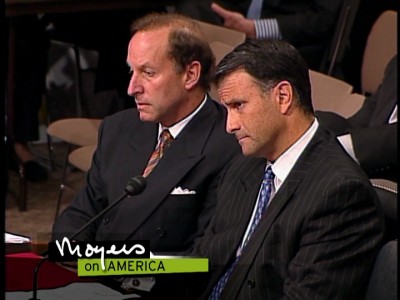
There could scarcely be a more appropriate time to make available, for our enlightenment, edification, and horror, Bill Moyers's 2006 special Capitol Crimes. This two-hour program retraces the steps leading up and into the then-current Jack Abramoff lobbying scandal, the most egregious example (that we know of) of a long-running Capitol Hill culture of lobbying, barely concealed bribery, and the frank whoring-out of the power that rightfully belongs to us, the citizens/constituents, in our so-called democracy. The same concerns that the brazenly illegal and unethical power-brokering then imprinted onto the public consciousness as synonymous with "Abramoff" (at least for a few nonstop, rapid-fire cable news cycles) are today once more at the forefront of conscientious citizens' minds in the form of a growing public outcry against last year's Citizens United v. Federal Election Commission Supreme Court ruling, which opened the floodgates of corporate money already flowing heavily into politics--taking the already problematic fact of bribes-by-other-names that traditionally run rampant in government and removing any lid or real regulation from how extravagant and extensive that purchasing of influence on policy can be. For an accurate sense of how truly disheartening and dubiously constitutional the Citizens United decision is, a strong illustration of how more, not less control and restriction of the influence of financial donations and other compensatory forms of lobbying (free luxury meals, trips, and other things Abramoff used as compensation for pliant lawmakers) is needed if there is to be any real American democracy--an in-depth look at how deeply destructive the ability of wealthy interests to just buy influence on public policy can be--would seem to be in order. And that is what the venerable Mr. Moyers--one of the few actually fair and balanced, truly investigative voices left in the jungle of 24-hour punditry and opinion-spouting, and in the twilight of televised journalism--has provided by recapping the cautionary political horror story of Jack Abramoff.
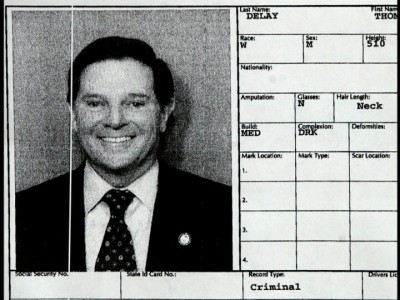
In classic Moyers style, Capitol Crimes calmly, cohesively stitches together a sampler comprised of televised footage from the Senate hearing at which Abramoff, accused of egregiously and repeatedly breaking lobbying laws, repeatedly invoked the fifth amendment to avoid admitting his habitual wrongdoing; interviews with former Abramoff associates (including some College Republican colleagues of Abramoff's youth who claim that even back then, in the relatively small-time framework of a campus political organization, Abramoff was a financially reckless schemer); interviews with Pulitzer Prize-winning Washington Post journalist Jeffrey Smith, who helped bring the story to the American people; and Moyers' voiceover detailing the complicated story of Abramoff's Washington, D.C. dealings and influence, dabbing all the little dots of the scandal onto its canvas and pulling back at interludes to show us the emerging portrait of a rare sort of feckless crook. Abramoff was a flat-out, conniving mercenary who sucked other weak-spined guns for hire, including now-disgraced Republican Speaker of the House Tom DeLay and hatemongering right-wing boy wonder/former Christian Coalition figurehead Ralph Reed, into his sphere of professional lobbying. Using Abramoff's connections with DeLay, the unsavory and extremely influential anti-tax activist Grover Norquist, and the Bush White House, this cabal committed multiple illegal acts of influence peddling. These included taking money from good-faith political donors who believed they were paying for straightforward lobbying, abusing their ability to convince various conservative and other political interests that they were people of principle, and then lining their own pockets, sometimes double-crossing clients and playing both ends against the middle to further enrich themselves; creating conservative-biased blacklists in the lobbying world to ensure Republicans received disproportionate donations, thereby remaining in control, thereby attracting more money, etc., in a vicious circle of money and power; and generally forsaking any of their supposed conservative "principles" for bald-faced greed, hunger for power, and conspiracy to commit illegal acts and cover them up.

Beyond the money-laundering illegality of Abramoff's moving funds from donors through political action committees and then around between his own pockets, those of his associates, and those of whomever he was bribing in Congress (the primary violators/willing political prostitutes being DeLay and Republican representative from Ohio Bob Ney), there is the rank hypocrisy of Abramoff's gang. For just one example, Reed, the Christian poster boy who was adamantly and unequivocally opposed to gambling, knew full well that much of the money being forwarded to him came to Abramoff from Native American hiring the lobbyist to advocate for the continuing legality of their casinos. One may disagree with the conservative donors and constituents who believed their association with and donations to Abramoff would make for a better, more "moral" world, but you have to feel for them; they were dragged into the stickiest, most discrediting mud conceivable by people who claimed to share their beliefs but whose only unwavering commitment was to getting away with robbery and experiencing the thrill of pulling the wool on a grand scale.

It was under the Bush administration and a concurrent mid-'00s Republican-majority rule in Washington that the crimes of K Street (the Washington road where many lobbying firms had amassed), always a plague on Washington, began to ratchet up to an extraordinary degree of boldness, which one could argue (as Moyers implicitly does) is nothing but the manifestation of neoconservative wealth-and-power worship and an underlying conviction that morally toxic, duplicitous means justify righteous ends. By the end of Capitol Crimes, despite Moyers's fair-minded acknowledgment that shady money and quasi-bribery is hardly restricted to just one of our two ruling parties, practically the entire neoconservative movement and value system as it manifested in the Bush era is indicted as complicit--negligently/passively at best, very actively and with full knowledge at worst--in the game Abramoff so cleverly mastered.
As Moyers points out, these were not victimless crimes; they resulted in U.S. government policy that caused unwarranted personal hardship and economic stagnation for many people. Without going into all the convolutions of the Abramoff saga (which makes Capitol Crimes, at times, as suspenseful as All the President's Men), suffice it to say that both various Southern U.S. Native American tribes looking to better their conditions through legal casino gambling and misleadingly recruited, practically indentured-servant sweatshop workers on the Pacific island of Saipan (a U.S. territory that Abramoff, Norquist, and DeLay self-servingly turned into a conservative cause célèbre, a "petri dish of free-market capitalism") suffered real, harshly unfair setbacks and sometimes unforgivable misery as a result of Tom DeLay and Ralph Reed being flown around by Jack Abramoff on "research" (read: luxury golfing) trips to Scotland, etc., on their dime and then failing to effect the promised policy reforms or protection these donors were seeking through them from the government. And that's in addition to the less directly felt indignity suffered by the sincere activists duped by Abramoff and his cronies as well as by any of us who believe in checks and balances, transparency, and real democratic practice.
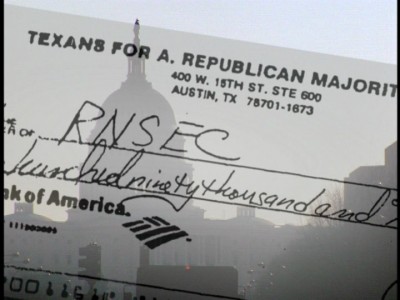
If there is one slight misstep in the way Capitol Crimes has been put together, it is that there are here, unusually for Moyers, bits of cheesy superfluity--ominous music over copious close-ups of Abramoff looking sinister (he has no other look, and as usual for this kind of glad-handing, overconfident snake-oil salesman, smiling only makes it creepier); lines from horrible e-mails between Abramoff, Reed, and Scanlon, full of obnoxious, legality-flouting expressions of contempt, that are interpreted by actors in voice-over--but they can dilute neither the grotesque wallowing in greed and avarice on incontrovertible display in the e-mails nor the appalling, angering revelation of sheer disdain on the part of these charismatic, duplicitous criminals for everyone and everything except their own greed, self-regard, and total, brazen lack of conscience or principle. (Anyone who can discern the tone of an e-mail will be reading those messages in their head in exactly the same sneering alpha-male manner in which the voice actors read them aloud; the worst that can be said of these added bits of business is that they're unnecessarily distracting and overemphatic, not really that they're inaccurate.)
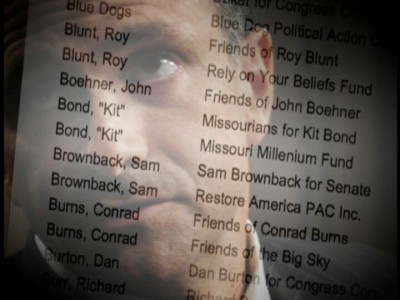
As a postscript to his Abramoff postmortem, Moyers spends the final segment of the program in an extended, in-depth conversation with progressive Pity the Billionaire author Thomas Frank and conservative commentator Norman Orstein, an expert on our legislative branch. This discussion, with its surprise, encouraging concurrence of strong ethical opinion from both right and left in the form of Frank's and Orstein's joint condemnation of the utterly, potentially permanently corrupting influence of lobbying culture in Washington could conceivably be of some galvanizing, inspirational use when it comes to involvement of non-media, non-political-establishment, "ordinary" Americans. It's the kind of actually useful, pragmatic "bipartisan" practice--a real fight for and finding of common ground--that our current president less and less convincingly claims to be seeking as he seems to capitulate ever further rightward in the pursuit of a back-patting, "objective," chimerical version of bipartisanship. In that sense, Capitol Crimes sees Moyers once again doing right by the obligations of the journalist's profession and performing the essential role he has so often (and, in recent years, virtually alone in terms of national television) played: that of a rational, respectful beacon of responsible journalism who's committed to giving the citizenry a clear but complete-as-possible look at the facts of the matter at hand, however forbiddingly complicated, status quo-displeasing, or discouraging, so that we can ponder and act upon them from a place of being informed and responsive, not riled-up and reactionary.
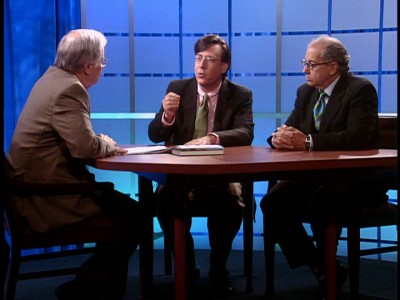
THE DVD:
The basic source materials of the programs (all presented in the standard pre-HDTV 4:3 aspect ratio) are varying qualities of videotape (the best being that created for the new segments with Moyers and his interviewees, which is reasonably up-to-date, high-def digital video and easily the least visually compromised of the assortment), so there is plenty of noise and artifacting endemic to the older tapes and/or the third-hand excerpting of them. But as far as the transfer of the programs themselves onto disc, none of the visual "flaws," which are themselves a product of fidelity to the images in the program as they would have appeared when originally broadcast, can be attributed to the transfer onto disc.
Sound:The disc's Dolby Digital 2.0 stereo soundtrack is of identical (if not superior) quality to the best possible broadcast sound. It's a basic, TV-news-journal sound mix that needs only convey theme/background music and talking-head verbalization, but in that limited context, the sound is virtually flawless.
Extras:As usual, Athena Learning, the distributor of Bill Moyers: Capitol Crimes, has loaded up the package to the point of fairly groaning under the weight of its bounteous relevant extras, so many that they require an additional disc. Disc two contains the 2007 Moyers special Buying the War, a postmortem that does for the press/White House collusion leading up to our 2003 invasion of Iraq what Capitol Crimes did for the Abramoff scandal. Here, all the lies and omissions that spread through the closed circuit of the White House, cable news, and the so-called "liberal media" (how anyone can still use that expression with a straight face will be even further beyond you after you see the meticulously researched, minutely specific, thorough case laid out here), infecting a credulous, incurious majority of Americans, are dissected in purely fact-based detail, and it (re)provokes a wave of nausea over that tragically misguided invasion that any thinking American, if they didn't feel it during the purposely mendacious 2003 blur created by the government and mainstream media, has no excuse not to experience now. It's rife with interviewees (including tele-journalists like Dan Rather, Meet the Press's Tim Russert, and 60 Minutes's Brian Rose, and even a few of the pundits who supported the war like New Republic editor Peter Beinart) looking shamefaced and admitting their collusion, negligence, and failure of journalistic principle, stammering their apologies in the face of Moyers's utterly reasoned, calm, devastating questions pointing up how easily they could have discovered and revealed the facts of the matter if they hadn't been in the Bush Administration's pocket and cowed by bullying, warmongering "patriots" in the media and the blogosphere. It's sobering, richly informative viewing.
Other bonus materials included on disc two are a couple of episodes of Moyers Journal that also fit easily under the category of "capitol crimes." "A Conversation with Historian and Writer Andrew J. Bacevich," in which a thoughtful, learned, and accomplished Vietnam veteran/professor Bacevich urges the U.S., its government, and its people to take a good, hard look at ourselves in the mirror--our addictions to debt, oil, and consumption--and fix our own problems instead of going on imperialist adventures in order to continue the superficial version of "freedom" he convincingly argues we've adhered to for decades now. It's one of the best, most cogent and well-supported cases ever made for taking another look at Jimmy Carter's unduly dismissed 1979 "malaise" speech (as well as a deeply effective rebuke to delusional, willfully-ignorant "morning in America" thinking we've been plagued with since Reagan); it may just convince someone, somewhere that the very definitive cornerstones and pinnacles of freedom and liberty actually aren't cheap gas and unfettered shopping. "A Discussion with Mother Jones Contributor Kevin Drum and Washington Bureau Chief David Corn" goes in-depth with those representatives of the venerable liberal journal for yet another sobering exploration of where we've come up short in our national prioritizing, doing for the 2008 financial crisis and its shockingly wealth-favoring aftermath what Capitol Crimes did for the lobbying circus in Washington and what Buying the War did for the falsely advertised, insupportable (by facts or reason) war in Iraq: It takes a good, hard, systematic, depressing but vitally important look at the facts of Wall Street arrogance and greed, demanding to know what the hell went wrong with the American people's powers of attentiveness, reason, and morality in the wake of our (and the world's) victimization. The case that we're puttering dangerously along as a "democracy in name only" has rarely been made more cohesively, accurately, and convincingly than it is in these supplements.
Other supplements include an onscreen-text Capitol Crimes updates--a where-are-they-now detailing the (deservedly dwindling or disastrous) post-scandal fortunes of principal players like Abramoff, DeLay, and Reed--as well as a six-page booklet with a brief history of lobbying in America, a description of the (insufficient but better-than-nothing) lobbying safeguards that have been instituted since the Abramoff affair, and graphs detailing some statistical facts about lobbying spending and number of lobbyists working, as well as gauging the confidence of the American people in their government (which, according to this information, had reached an all-time low in 2010).

Despite some unusual (for Moyers), moderate slight stylistic missteps (occasional musical and dramatic effects that are unnecessary, overly manipulative, and may actually detract from the potency of what's being documented), Capitol Crimes is a well-prepared, essential slice of recent history for anyone, from any part of the political spectrum, who genuinely believes in ethical political conduct and is outraged by the egregiousness with which that very concept has been disregarded in the corridors of power. Moyers has gathered and clearly organized as many facts as available and as much qualified, in-depth commentary as possible to brief us on the Jack Abramoff scandal that erupted in 2006, following the nefarious political soldier of fortune from his College Republican origins through a ferociously ambitious career in conservative politics to the moment the lid was blown off the "K Street" culture of Republican lobbyists and conservative politicians to which he played kingpin--a viper's nest of powerful people who abused their influence and elected offices, sold votes, warped and mocked the idea of representative government, and created and drove an illegal, unethical power machine committed to a permanently Republican executive and legislative branch, with prominent figures like House Majority Leader Tom DeLay and right-wing ringleader Ralph Reed hypocritically grabbing whatever they could for their grossly unprincipled, ransacking, money-grubbing (and therefore remarkably un-Christian) selves in the process.
The program does implicitly raise the "partisan" proposition that these kinds of misdeeds are an inevitable result of "renegade," quasi-fascist neoconservative "principles" once they gain traction and hatch out into our world (something like--and this is my comparison, not Moyers's --that rapacious bowel-dwelling monster in Alien). But more importantly, Moyers and his able researchers take us an even further step back to look at the degree of influence money carries in our politics, which is so high that it makes the center of American governmental power a poisonous atmosphere that threatens to turn anybody of any political stripe into a wealth and luxury-subservient mercenary willing to sell off their vote or influence to the highest bidder for personal gain. In 2007, when the program was created and aired, Moyers couldn't have foreseen the current Citizens United brouhaha (which deregulates even further the influence of money and monied interests on the laws of our land) now alarming Americans in increasing numbers, but that prominent blotch on the political landscape of here and now makes what Moyers is bringing to our attention in Capitol Crimes all the more important and useful as a contextualizing reminder of recent history. Its trenchant prescience and rock-solid informativeness prove once again that Moyers has his steady journalistic finger on the pulse of what really matters to American citizens in a way virtually nobody else in his position can claim to. Highly Recommended.
|
| Popular Reviews |
| Sponsored Links |
|
|
| Sponsored Links |
|
|
| Release List | Reviews | Shop | Newsletter | Forum | DVD Giveaways | Blu-Ray | Advertise |
|
Copyright 2024 DVDTalk.com All Rights Reserved. Legal Info, Privacy Policy, Terms of Use,
Manage Preferences,
Your Privacy Choices | |||||||












